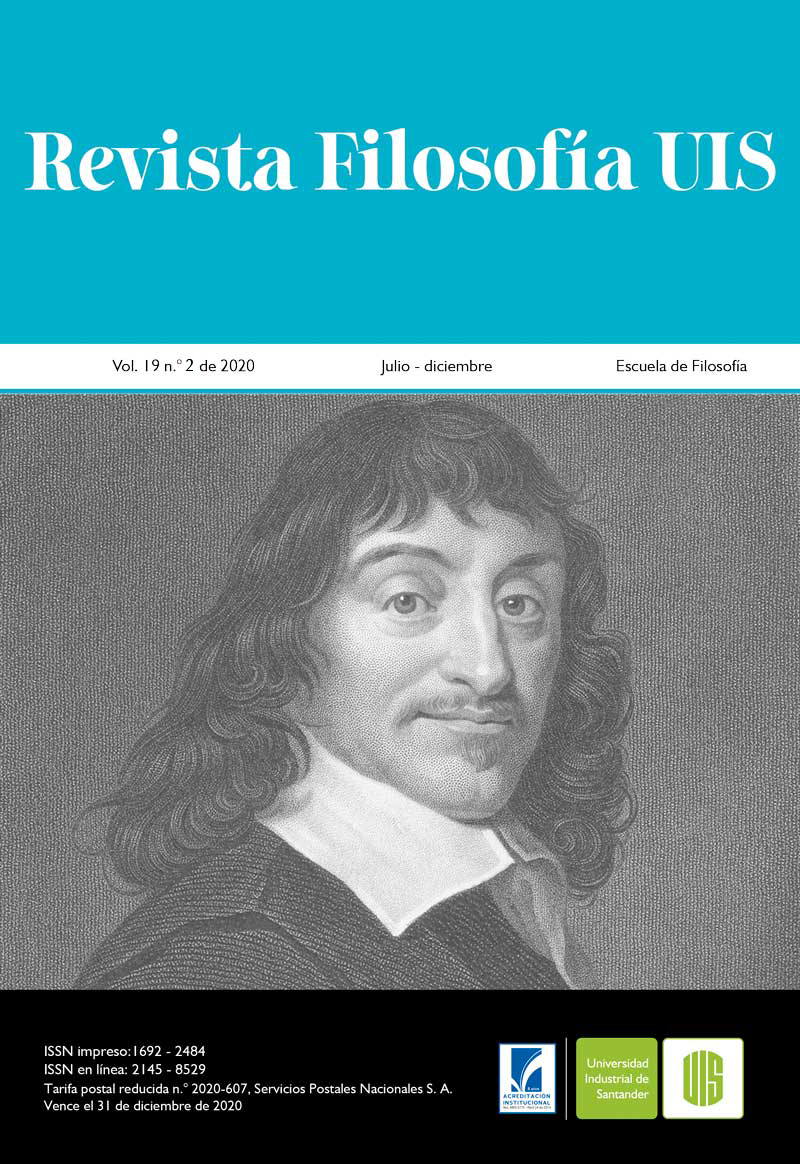Descartes’s modern conception of happiness
Published 2020-05-27
Keywords
- happiness,
- highest good,
- virtue,
- pleasure,
- end of our actions
How to Cite
Copyright (c) 2020 Revista Filosofía UIS

This work is licensed under a Creative Commons Attribution 4.0 International License.
Abstract
In this article, I want to show Descartes’s new conception of happiness and his reformulation of the Greek eudaemonist model. I want to highlight three features of the Cartesian theory of happiness. First, Cartesian happiness is not a good but the pleasure we enjoy when we possess the highest good. Second, Cartesian happiness is not our highest good. Third, Descartes identifies two ends for our actions. These three features establish an important distance between the Greek tradition and the Cartesian theory of happiness. To examine the changes Descartes introduces in his analysis of happiness, I will center my exposition in these three features. Finally, I will show how Descartes interprets the ancient theories of Aristotle, Zeno and Epicurus.
Downloads
References
Annas, J. (2011). Intelligent Virtue. Oxford University Press.
Aristóteles (1985). Ética nicomáquea. Ética eudemia. (J. Pallí Bonet, trad.). Gredos.
Cottingham, J. (1998). Philosophy and the Good Life. Reason and the Passions in Greek, Cartesian, and Psychoanalytic Ethics. Cambridge University Press. https://doi.org/10.1017/CBO9780511612237
Descartes, R. (1996). En C. Adam & P. Tannery (eds.). Oeuvres de Descartes. Librarie Philosophique J. Vrin.
Descartes, R. (1999). Discurso del método. La búsqueda de la verdad mediante la luz natural (V. Florián, trad.). Panamericana.
Descartes, R. (2010). Las pasiones del alma (J. A. Martínez & P. Andrade, trads.). Tecnos.
Faye, E. (1998). Philosophie ou la perfection de l’homme. De la Rennaissance à Descartes. Librarie Philosophique J. Vrin.
Furetière, A. (1690). Dictionnaire universel. Arnout & Reinier Leers.
Kambouchner, D. (2001). Descartes (1596-1659): bonheur et utilité. En A. Caillé, C. Lazzeri & M. Senellart (eds.). Histoire raisonnée de la philosophie morale et politique (pp. 305-310). La Découverte.
Laercio, D. (2016). Vidas y opiniones de los filósofos ilustres. (C. García Cual, trad.). Alianza.
Leibniz, G. W. (1880). Die philosophischen Schriften. Vol. 4. (C. I. Gerhardt, ed.). Weidmannsche Buchhandlung.
Long, A. A. (1996). Stoic Studies. University of California Press.
Long, A. A. (2006). From Epicurus to Epictetus. Studies in Hellenistic and Roman Philosophy. Oxford University Press.
Marshall, J. (1998). Descartes’s Moral Theory. Cornell University Press.
Platón (1983). Diálogos. Vol. II. Gorgias. Menéxeno. Eutidemo. Menón. Cratilo. Gredos.
Platón (1986). Diálogos. Vol. III. Fedón. Banquete. Fedro. Gredos.
Rodis-Lewis, G. (1997). Le developpement de la pensée de Descartes. Librarie Philosophique J. Vrin.
Rodis-Lewis, G. (1998). La morale de Descartes. Presses Universitaires de France.
Rutherford, D. (2004). On the Happy Life: Descartes vis-à-vis Seneca. En S. Strange & J. Zupko (eds.). Stoicism: Traditions and Transformations (pp. 177-197). Cambridge University Press. https://doi.org/10.1017/CBO9780511498374.011
Schneewind, J. (1998). The Invention of Autonomy. A History of Modern Moral Philosophy. Cambridge University Press.
Séneca (1979). De la vida bienaventurada. En Cicerón & Séneca. Tratados morales (pp. 407-435). Editorial Cumbre.
Shapiro, L. (2011). Descartes on Human Nature and the Human Good. En C. Fraenkel, D. Perinetti & J. E. H. Smith (eds.). The Rationalists. Between Tradition and Innovation (pp. 13-26). Springer. https://doi.org/10.1007/978-90-481-9385-1
Sorell, T. (1993). Morals and Modernity in Descartes. En T. Sorell (ed.). The Rise of Modern Philosophy (pp. 273-288). Clarendon Press.
Striker, G. (1990). Ataraxia: Happiness as Tranquillity. The Monist, 73(1), 97-110. https://doi.org/10.5840/monist199073121
Svensson, F. (2015). Non-eudaimonism, the Sufficiency of Virtue for Happiness, and Two Senses of the Highest Good in Descartes's Ethics. British Journal for the History of Philosophy, 23(2), 277-296. http://dx.doi.org/10.1080/09608788.2014.982508

